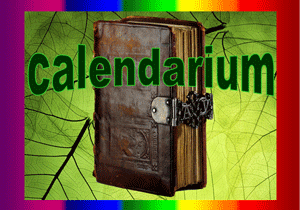Mensis Ianuarius, louwmaand, ijsmaand, wolfsmaand, hardmaand, Nieuwjaarmaand, wintermaand
Machteld Roede
calendarium 1, calendarium 2, calendarium 3 en calendarium 4 — januari 1, januari 2 en januari 3 — februari 1, februari 2 en februari 3 — maart 1, maart 2 en maart 3 — april 1, april 2 en april 3 — mei 1, mei 2 en mei 3 — juni 1, juni 2 en juni 3 — juli 1, juli 2 en juli 3 — augustus 1, augustus 2 en augustus 3 — september 1, september 2, september 3 en september 4 — oktober 1, oktober 2, oktober 3 en oktober 4 — november 1, november 2, november 3 en november 4 — december 1, december 2, december 3 en december 4
Upgrade 7 januari 2025
Bijzondere dagen
- 1 januari: Nieuwjaar
- 4 januari: Wereld Braille Dag (VN, sinds 2001)
- 6 januari: Driekoningen; Epifanie of Openbaring van de Heer (Christendom)
- 6 januari: Armeens Kerstmis — viering van de geboorte en doop van Jezus (Armeens Apostolische Kerk)
- 7 januari: Koptisch Kerstmis (Koptisch, Ethiopisch en Eritrees Orthodoxe Kerk) en Orthodox Kerstmis (Russisch, Servisch en Georgisch-Apostolische Autonome Orthodoxe Kerk en Armeens -apostolische kerk)
- 13 januari Yennayer (Nieuwjaar Amazigh of Berbers) Marokko
- 13 januari: internationale AMBER Alert-dag (sinds 1996, NL sinds 2008)
- 14 januari: Orthodox Nieuwjaar (Russisch, Servisch en Georgisch Orthodoxe Kerk)
- 19 januari: Koptisch Driekoningen (Koptisch, Ethiopisch en Eritrees Orthodoxe Kerk) en Orthodox Driekoningen (Russisch, Servisch en Georgisch Orthodoxe Kerk)
- 22 januari: Dag van de Oekraïense Eenheid (sinds 1919)
- 24 januari: Internationale dag van het onderwijs (VN, sinds 2019)
- 27 januari: Internationale Herdenkingsdag van de Slachtoffers van de Holocaust (sinds 2006, VN)
- 3e zaterdag van januari: Nationale Tulpendag (Tulpen promotie NL)
- laatste donderdag van januari: Gedichtendag (NL en Vlaanderen).
- laatste weekend van januari: Nationale Tuinvogeltelling (Vogelbescherming, NL)
- tussen midden januari en half februari: Chinees, Taiwanees, Mongools, Tibetaans, Vietnamees en Koreaans Nieuwjaar (i.c. Oost-Azië, sinds 2637 v.o.j.)
Weerspreuken
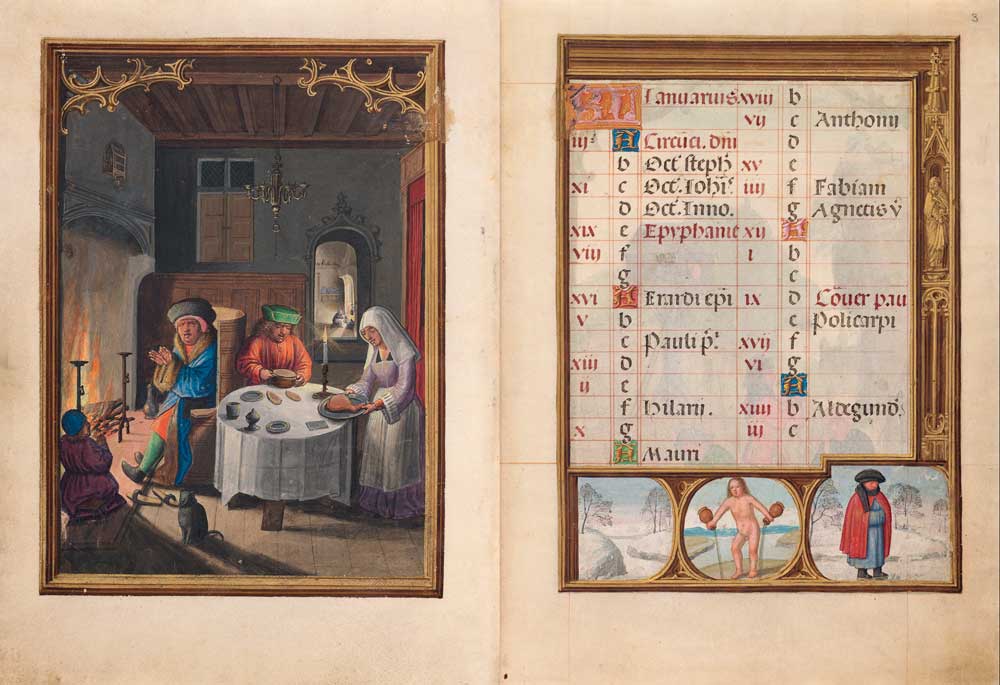
Nieuwjaarsnacht schoon en klaar beduidt een vruchtbaar jaar.
Schijnt de zon op nieuwjaar, dan komt er een goed appeljaar.
Draagt nieuwjaarsmaand een winterkleed, dan is de zomer zeker heet!!!
Met Driekoningen lengt de dag zoveel een geitje springen mag.
Driekoningenavond een sterre, dan is de lente nog verre.
Als het Driekoningen is in ’t land, komt de vorst in het vaderland.
Als het vriest op Driekoningendag, dan vriest het dertien weken lang.
Als ik januari was, deed ik de ketel boven het vuur bevriezen.
Geeft januari sneeuw en vorst, vaak de boeren veel granen dorst.
In januari moet het vriezen, de stenen uit de grond;
de boer en zal niet kniezen maar vindt dat heel gezond.
Valt in januari de sneeuw heel dik, dan is bij ‘t hooien de boer in zijn schik.
Geeft januari een sneeuwtapijt, dan zijn we gauw de winter kwijt.
Vorst bij afgaande maan, houdt meestal aan.
Zijn er januari veel mollen, dan laat de winter niet met zich sollen.
Stoot de mol in Januaar, kijk van kou in mei niet raar
Graaft de mier een diepe gang, dan wordt de winter streng en lang;
nog erger zal het ons berouwen, als ze hoge nesten bouwen.
Januari kan ons verklaren, dat men turf en hout moet sparen,
want daarna komt er een tijd, dat de boer op schaatsen rijdt.
In januari ziet de boer liever een wolf in het veld, dan een ploeg.
Sneeuw met donder in januaar, voelt men gans het jaar.
Als het in januari dondert, wees voor ziekten niet verwonderd
Nevels in januari opgestaan, brengen een natte lente aan.
Als in ’t louwmaand mistig is, wordt de lentemaand fris.
In januari veel regen en snee, doet aan ‘t gewas veel wee.
Vangt het jaar met regen aan, de oogst, die dreigt kapot te gaan.
In januari veel water brengt weinig wijn; weinig water brengt veel wijn.
Is het in januari nat, ledig blijven schuur en vat.
Als de kat in januari in de zon zit, ligt ze in februari achter de kachel.
Is januari te warm, dat dan de hemel zich erbarm!
Als in januari de muggen zwermen, dan kun je in maart de oren wermen.
Beter een dief op zolder dan mooi weer in januari.
Geeft januari géén wintervlagen, dan zal februari ons daarmee plagen.
Staat groen en fris in januari het gras, het hele jaar geeft vaak een schraal gewas.
Januarigedichten
When icicles hang by the wall

WHEN icicles hang by the wall,
And Dick the shepherd blows his nail,
And Tom bears logs into the hall,
And milk comes frozen home in pail,
When blood is nipp’d and ways be foul,
Then nightly sings the staring owl,
Tu-who;
Tu-whit, a merry note,
While greasy Joan doth keel the pot.
WHEN all aloud the wind doth blow,
And coughing drowns the parson’s saw,
And birds sit brooding in the snow,
And Marian’s nose looks red and raw,
When roasted crabs hiss in the bowl,
Then nightly sings the staring owl,
Tu-who;
Tu-whit, a merry note,
While greasy Joan doth keel the pot.
Songs William Shakespeare (1564-1616)
Blow, blow, thou winter wind
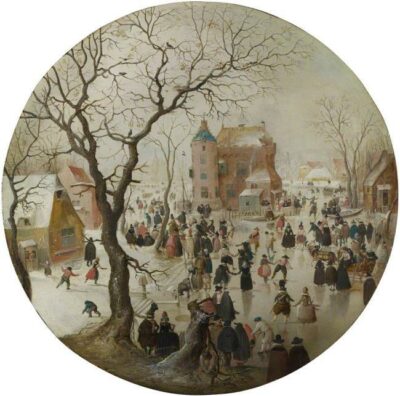
Blow, blow thou winter wind,
Thou art not so unkind
As man’s ingratitude;
Thy tooth is not so keen
Although thou art not seen,
Although thy breath be rude.
Heigh ho! sing heigh ho!
Unto the green holly:
Most friendship is feigning,
Most loving mere folly:
Then, heigh ho! the holly!
This life is most jolly.
Freeze, freeze thou bitter sky,
Thou dost not bite so nigh
As benefits forgot:
Though thou the waters warp,
Thy sting is not so sharp
As friend remember’d not.
Heigh ho! sing heigh ho!
unto the green holly:
Most friendship is feigning,
most loving mere folly
Then, heigh ho! the holly!
This life is most jolly.
Songs William Shakespeare (1564-1616)[3]
Nieuwjaar
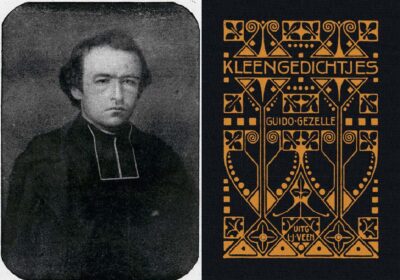
Het jaar is uit –
En tenden geleefd:
Van al zijne oude
ellenden en heeft
den last het ons ontgeven;
het nieuwjaar heeft,
van heden af aan,
voor elk ende een,
een schrede gedaan:
wie zal ‘t tot tenden leven?
Guido Gezelle (1830-1899)[5]
Neijoar
Wie aal ben zwaarvers
Van ‘t olle stee,
Woar voader waarkte
En lachte en lee,
Noar ‘n stille hörn
In ‘t wiede laand,
Woar ‘n stille mörn
Ons vindt in ‘t zaand …
En dut ‘t dan zeer,
En gluit de vout, —
Veuroet moar weer,
Het mout!
Wie aal ben zwaarvers,
Al bliev’ w’ op ‘t stee,
Woar d’ eerste mörn
Ons leven dee: —
In ‘t web van wegen
Deur heufd en haart
Zit wie verlegen,
Verdwaald, verwaard …
Gain vroag’: dut ‘t zeer?
Gain vroag’: berouwt’t? —
Veuroet moar weer,
Het mout!
J. Dijkstra (1879- …, p. 221[6])
Het Wonder en de Drie Wijzen
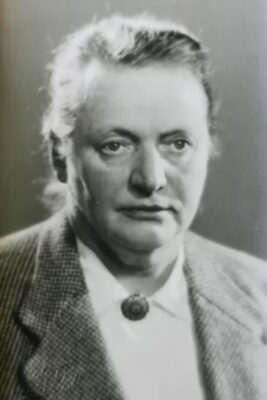
Langs ‘t wegje waar de wilgen staan,
Daar kwamen drie vreemde mannen aan,
De wind blies door de blaren.
Zij droegen een mantel van dikke stof,
Hun schoenen waren oud en grof,
En zilverwit glansden hun haren.
De wind blies toen de zomer weg,
Hij plukte de blaren van de heg,
Hij gierde om de toren.
De mannen vervolgden hun droeve tocht,
En geen die vond wat hij wel zocht:
Zij hadden et wonder verloren.
De dingen die men leren kan,
Daar wisten de mannen alles van,
Zij kenden alle boeken.
Maar wat eens hun kindsheid bezeten had,
— Zij konden zelf niet zeggen wat —
Het wonder, dat gingen ze zoeken.
En op een nacht, dat het steendik vroor,
Toen lichtte een groote ster hen voor,
Een ster, door God gezonden.
Zij zagen een stal en de deur stond aan,
Zij zijn er zachtjes ingegaan,
En hebben het wonder gevonden!
D.A. Cramer Schaap (1893-1976)[8]
Drie koningen
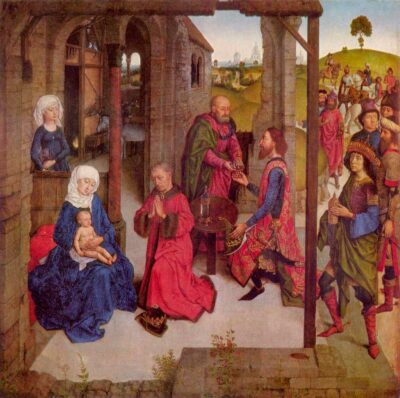
Drie koningen zijn op reis gegaan,
Hun schoonste gewaden hebben zij aan.
De eerste heeft een grijzen baard,
Hij rijdt op een stram en kreupel paard;
De tocht is zoo verre, de koning is oud;
Hij brengt aan het kindje zijn gaven van goud.
Drie koningen zijn op reis gegaan,
Hun schoonste gewaden hebben zij aan.
De tweede van den vreemden stoet,
Hij rijdt op een ros van vurig bloed;
De tocht duurt hem lang, want hij heeft geen geduld;
Hij draagt er een kistje met wierook gevuld.
Drie koningen zijn op reis gegaan,
Hun schoonste gewaden hebben zij aan.
De derde, die de rij besluit,
Hij ziet er zoo norsch en somber uit;
Hij tuurt in de verte, traag schrijdt zijn kameel;
De kost’lijke myrrhe brengt hij als zijn deel.
Het kindeke staart de mannen aan,
Die in vreemde gewaden voor ‘t kribje staan.
Hoe jong lijkt d’oude koning weer,
De tweede buigt diep in deemoed neer.
De sombere derde, ‘t is net of hij lacht;
En aan de geschenken heeft niemand gedacht.
D.A. Cramer-Schaap[10]
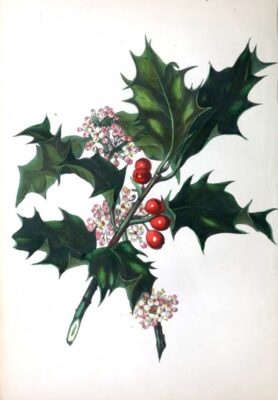
January
Keen blows the bitter spirit of the North,
And, like a warrior foil’d, with powerless beam
The sun eyes wistfully the frost-bound stream,
As if he long’d, though vainly, to call forth
His by-gone strength, that he might deck the earth
In all her summer beauty, and set free
River and brooklet, till, towards the sea
Onward they bounded with melodious mirth.
But many a storm, ere that may be, shall blow,
And many a cloud frown darkling o’er the sky;
And be it so, if but affection’s glow
Play round the lips, and brighten in the eye,
When round the hearth long-sever’d friends do meet,
(So ancient usage claims,) the opening to greet.
Rebecca Hey (1797–1859)
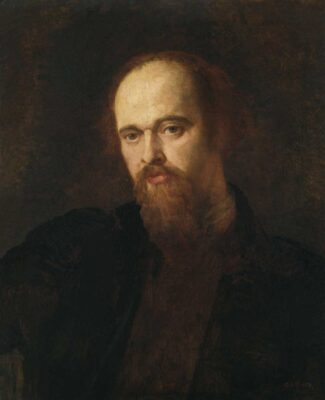
January
For January I give you vests of skins,
And mighty fires in hall, and torches lit;
Chambers and happy beds with all things fit;
Smooth silken sheets, rough furry counterpanes;
And sweetmeats baked; and one that deftly spins
Warm arras; and Douay cloth, and store of it;
And on this merry manner still to twit
The wind, when most his mastery the wind wins.
Or issuing forth at seasons in the day,
Ye’ll fling soft handfuls of the fair white snow
Among the damsels standing round, in play:
And when you all are tired and all aglow,
Indoors again the court shall hold its sway,
And the free Fellowship continue so.
Dante Gabriel Rossetti (1828-1882)[13]
Winterstilte
De grond is wit, de nevel wit,
De wolken, waar nog sneeuw in zit,
Zijn wit, dat zacht vergrijzelt.
Het fijngetakt geboomte zit
Met witten rijp beijzeld.
De boom houdt zich behoedzaam stil,
Dat niet het minste takgetril
’t Kristallen kunstwerk breke,
De klank zelfs van mijn schreden wil
Zich in de sneeuw versteken.
De grond is wit, de nevel wit,
Wat zwijgend tooverland is dit?
Wat hemel loop ik onder?
Ik vouw de handen en aanbid
Dit grootsche, stille wonder.
Jacqueline van der Waals (1868-1922)
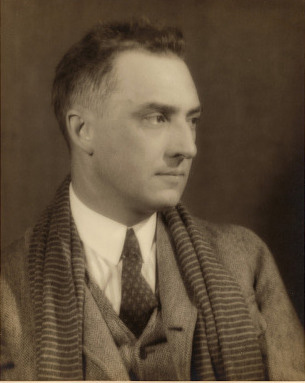
January
Again I reply to the triple winds
running chromatic fifths of derision
outside my window:
Play louder.
You will not succeed. I am
bound more to my sentences
the more you batter at me
to follow you.
And the wind,
as before, fingers perfectly
its derisive music.
William Carlos Williams (1883-1963)

Letter Written During a January Northeaster
Monday
Dearest,
It is snowing, grotesquely snowing
upon the small faces of the dead.
Those dear loudmouths, gone for over a year,
buried side by side
like little wrens.
But why should I complain?
The dead turn over casually,
thinking:
Good! No visitors today.
My window, which is not a grave,
is dark with my fierce concentration
and too much snowing
and too much silence.
The snow has quietness in it; no songs,
no smells, no shouts nor traffic.
When I speak
my own voice shocks me.
Tuesday
I have invented a lie,
there is no other day but Monday.
It seems reasonable to pretend
that I could change the day
like a pair of socks.
To tell the truth
days are all the same size
and words aren’t much company.
If I were sick, I’d be a child,
tucked in under the woolens, sipping my broth.
As it is,
the days are not worth grabbing
or lying about.
Monday
It would be pleasant to be drunk:
faithless to my own tongue and hands,
giving up the boundaries
for the heroic gin.
Dead drunk
is the term I think of,
insensible,
neither cool nor warm,
without a head or a foot.
To be drunk is to be intimate with a fool.
I will try it shortly.
Monday
Just yesterday,
twenty eight men aboard a damaged radar tower
foundered down seventy miles off the coast.
Immediately their hearts slammed shut.
The storm would not cough them up.
Today they are whispering over Sonar.
Small voice,
what do you say?
Aside from the going down, the awful wrench,
The pulleys and hooks and the black tongue …
What are your headquarters?
Are they kind?
Monday
It must be Friday by now.
I admit I have been lying.
Days don’t freeze
And to say that the snow has quietness in it
is to ignore the possibilities of the word.
Only the tree has quietness in it;
quiet as a pair of antlers
waiting on the cabin wall,
quiet as the crucifix,
pounded out years ago like a handmade shoe.
Someone once
told an elephant to stand still.
That’s why trees remain quiet all winter.
They’re not going anywhere.
Monday
Dearest,
where are your letters?
The mailman is an impostor.
He is actually my grandfather.
He floats far off in the storm
with his nicotine mustache and a bagful of nickels.
His legs stumble through
baskets of eyelashes.
Like all the dead
he picks up his disguise,
shakes it off and slowly pulls down the shade,
fading out like an old movie.
Now he is gone
as you are gone.
But he belongs to me like lost baggage.
Anne Sexton (1928-1974)[16]
De spin Sebastiaan
Dit is de spin Sebastiaan.
Het is niét goed met hem gegaan.
luister!
Hij zei tot alle and’re spinnen:
Vreemd, ik weet niet wat ik heb,
maar ik krijg zo’n drang van binnen
tot het weven van een web.
Zeiden alle and’re spinnen:
O, Sebastiaan, nee, Sebastiaan,
kom, Sebastiaan, laat dat nou,
wou je aan een web beginnen
in die vreselijke kou?
Zei Sebastiaan tot de spinnen:
’t Web hoeft niet zo groot te zijn,
’t hoeft niet buiten, ’t kan ook binnen
ergens achter een gordijn.
Zeiden alle and’re spinnen:
O, Sebastiaan, nee, Sebastiaan,
toe, Sebastiaan, toom je in!
Het is zó gevaarlijk binnen,
zó gevaarlijk voor een spin.
Zei Sebastiaan eigenzinnig:
Nee, de Drang is mij te groot.
Zeiden alle and’ren innig:
Sebastiaan, dit wordt je dood …
O, o, o, Sebastiaan!
Het is niet goed met hem gegaan.
Door het raam klom hij naar binnen.
Eigenzinnig! En niet bang.
Zeiden alle and’re spinnen:
Kijk, daar gaat hij met zijn Drang!
pauze
Na een poosje werd toen éven
dit berichtje doorgegeven:
Binnen werd een moord gepleegd.
Sebastiaan is opgeveegd.
Annie M.G. Schmidt (1911-1995)[17]
Noten
[0] Bron: Da Costa Getijdenboek, januari (circa 1515) — Simon Bening.
Miniatuur van een — met een tafel met vazen en een kaars, stoelen en kroonluchter ingerichte — kamer. Een vogelkooi hangt boven de openhaard. Op de achtergrond is de keuken zichtbaar. Een man verwarmt zich voor de open haard. Op de grond knielt een jongen, naast hem zit een kat. De man aan de tafel houdt een kom vast. De vrouw dient een schaal met vlees op. Aan de rechterkant van het frame staat een standbeeld in een architecturale nis. Onder de kalendermaand staan drie verschillende afbeeldingen: een winterlandschap; het sterrenbeeld Waterman: een naakte man giet water uit twee vaten; en een op een bevroren rivier schaatsende man. De scènes zitten in illusionistische houten lijsten. MS M.399, fol. 2v en MS M.399, fol. 3r, Morgan Library and Museum, NY.
[1] Bron: William Shakespeare — John Taylor, National Portrait Gallery, London
[2] Bron: IJsgezicht bij een kasteel (circa 1608) — Hendrick Avercamp, National Gallery, London
[3] Een beroemde passage uit akte 2, scène 7 van As You Like It.
[4] Bron: Guido Gezelle, Vlaams priester-dichter (1860) — fotograaf onbekend. Uit: Dietsche Warande en Belfort, Siffer & Coebergh, 1900
[5] Uit: Guido Gezelle (1905) Kleengedichtjes. Uitgeverij L.J. Veen
[6] In: Ter Laan, K., G.W. Spitzen en G. Stel (1923, 1e druk) Laandjebloumen, bloemlezing uit de letterkundige voortbrengelen in de Groninger Volkstaal. p. 44. Groningen: Drukkerij-Uitgeverij C. Weis. Met ‘Veuraof door Geert Teis Pzn.’, pseudoniem van G.W. Spitzen (1864-1945). Geraadpleegd op 2022-12-07. dbnl.org/arch/laan005laan01_01/pag/laan005laan01_01.pdf
[7] Bron: D.A. Cramer Schaap — fotograaf onbekend, Kinderboeken.nl
[8] Uit: Verzen. Deel I. (1928) red. J. Aleida Nijland. 5e druk. Amsterdam: L.J. Veen.
[9] Bron: Aanbidding door de Wijzen (ca. 1465) — Dirk Bouts, Vleugelaltaar ‘De Parel van Brabant’, middenpaneel, Alte Pinakothek, München
[10] Drie koningen — Uit: D.A. Cramer Schaap, Tijdschrift Droom en Daad. Jaargang 3 (1925), www.dbnl.org
[11] Bron: Hulst — Rebecca Hey, uit: The Spirit of the Woods (Longman, 1837)
[12] Bron: Dante Gabriel Rossetti (circa 1871) — George Frederic Watts, National Portrait Gallery, Londen
[13] Origineel: Folgore da San Geminiano
[14] Bron: William Carlos Williams (1924) — foto Man Ray
[15] Bron: Anne Sexton (circa 1970) — foto Elsa Dorfman
[16] Uit: The Hudson Review, Vol. XV, no 2, Summer 1962
[17] Uit: Annie M.G. Schmidt (1951) Dit is de spin Sebastiaan, gedichten- en verhalenbundel. Amsterdam: De Arbeiderspers

